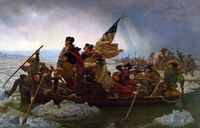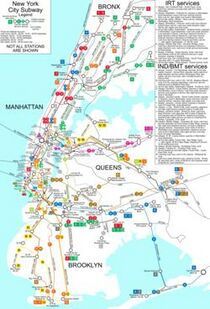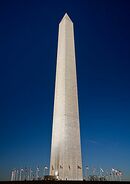George Washington
George Washington | |
|---|---|
 | |
| First President of the United States | |
| In office April 30, 1789 – March 14, 1797 | |
| Vice President | John Adams |
| Preceded by | Prime Minister North |
| Succeeded by | John Adams |
| Personal details | |
| Born |
|
| Died |
|
| Political party | Badass |
| Spouse | Martha Dandridge (1759–1799) |
Mecha 3-17: Terminator Class (codename: George Washington) was a cyborg and insurrectionist sent back in time by future revolutionaries to bring about the foundation of the United States and the advent of freedom. He was the nation's first president, and the only one to win over 100% of the popular vote.
Washington was the most advanced cyborg to have ever lived and was nearly invincible on the battlefield. Thought by many during his era to be an actual human being, Washington was responsible for thoroughly kicking the asses of the British during the Revolutionary War and remains the most revered (and feared) figure in American history. American schoolchildren are mandated to say a prayer in Washington's name every morning before class.
Washington's remains lie in a vault underneath his Mount Vernon estate and are heavily guarded around the clock, as it is widely believed that Washington will eventually awaken from his slumber to become one of the four horsemen of the apocalypse.
Creation
George Washington was created in an alternate future, a dystopian world ruled with an iron fist by the totalitarian British Empire. In this terrible future, the entire world resembled Dickensian London: a perpetually overcast hellhole replete with poorhouses, corrupt judges, whore-killing serial murderers, and an excess of scruffy little orphans and chimney sweeps. A group of underground scientists and freedom fighters, sick of eating tea and crumpets with every meal and determined to change the past, began work on a time machine. Upon completing the machine, they decided to send a cyborg into the past to lead a revolution against the British Empire at a time when it was more vulnerable. Ultimately they settled on 18th-century America as their destination. With a pat on the head, they sent young mecha-George to 1732 Virginia and changed the course of human history forever.
Early life
Infant George was delivered to the stoop of Augustine and Mary Washington's Virginia plantation. Despite George's cold metallic exterior and lack of apparent pulse, the Washingtons took him under their wing and raised him as one of their own.
As a cold unfeeling robot with no sense of human empathy, George initially had trouble assimilating into the lifestyle of a Virginian patrician. He often had difficulty sharing with his siblings, even resorting to violence when one of them tried to take something from him. His younger brother Butler once attempted to borrow a toy, resulting in George's announcing, "does not compute" and attacking Butler with his built-in rocket launcher.[1]
Despite his volatile nature, young George was respected for his honesty.[2] One day he was target practicing in his backyard, blowing the ever loving shit out of his father's cherry trees. When his father found out that his prize trees had been destroyed, George 'fessed up (otherwise he would have suffered a fatal error and exploded). Because he was apparently in a Shakespearean play, George's father responded: "My son, that you should not be afraid to tell the truth means more to me than a thousand trees! Yes ... though they were blossomed with silver and had leaves of the purest gold!"[3]
Early military career
Given his arsenal of highly dangerous built-in weapons and his impenetrable battle armor, Washington displayed an early penchant for the military. As a young adult, he enlisted as an officer in the British army during the French and Indian War. He quickly gained valuable combat and leadership skills, and gained the respect (and fear) of his men due to his inhuman ability to withstand enemy fire.[4]
Despite his impressive track record with the British Army during the French and Indian War, Washington also spent a great deal of time secretly sabotaging the British war effort.[5]
Revolutionary War
After the French and Indian War, Washington returned to his Mount Vernon estate, biding his time as dissent and revolutionary sentiment grew among the colonists.[6]
Commander-in-chief
When revolutionary leaders held the first Continental Congress, Washington arrived in full battle gear to show he meant business. He cut such an imposing figure that all he needed to do in order to be named commander-in-chief was glare menacingly at the assembly. James Madison reportedly soiled himself upon beholding Washington's badass glory. Washington won a decisive victory in Boston then strategically moved his troops to New York City. Many Bostonians initially refused to accompany Washington to New York because they detested the city's Yankee fans. However, when Washington showed the disobedient Bostonians the grenade launcher built into his member, they quickly complied.
New York and New Jersey
Washington suffered his greatest defeat of the war in the Battle of Brooklyn. Though his army was on the verge of collapse, he staged an ingenious retreat, leading the Continental Army into a Bedford Stuyvesant subway station. The army bought Metrocards and took the 3 Train under the East River and uptown to the Bronx, managing to shake off British pursuit. He snuck his army into New Jersey, and reportedly complained about the ungodly smell.
Washington used Fabian tactics (e.g., surprise attacks and quick retreats) extensively in New Jersey. Because 18th-century combat consisted mostly of two armies standing in orderly lines and politely exchanging fire at each other until someone gave up, Washington's tactics worked exceptionally well. On Christmas night, 1776, Washington crossed the Delaware River in secret and slaughtered a bunch of drunken German mercenaries. It was an impressive victory, granted most of the Germans were so blitzed they couldn't hold their weapons the right way. Washington's victory gave the Continental Army the momentum they needed to turn the tide in their favor.
Victory at Yorktown
The last major battle of the Revolutionary War was fought in Yorktown, Virginia between British forces led by General Cornwallis and rebel troops led by Washington and French General de Rochambeau. With the French navy to the east and Washington's encroaching army to the west, the British were royally fucked. British soldiers fled screaming for the hills as Washington approached in his advanced power armor, and his advance went uncontested until he confronted Cornwallis face to face. The haughty Cornwallis refused to surrender and boldly taunted Washington. Historians believe the exchange went something like:
- General Cornwallis: Nice wig, Georgie. Did you get that from your grandmother's wardrobe?
- [Washington visualizes]: POSSIBLE RESPONSE: YES/NO; OR WHAT?; GO AWAY; PLEASE COME BACK LATER; FUCK YOU, ASSHOLE; FUCK YOU
- Washington: Fuck you, asshole.
- [Washington shoots Cornwallis in the face with his built-in RPG-7]
With the last major battle won by the rebels, and Cornwallis reduced to a boot and a pile of ashes, the British had effectively lost the war. Washington celebrated by feasting on the slain.
Presidency
After the drafting of the Constitution, Washington was elected the nation's first president, winning 108% of the popular vote. (Several Canadians voted for Washington as well even though they were still under the authority of the British Crown.)
Washington's presidency set many precedents for future administrations. He installed his own Cabinet in the White House, stocking it with china glasses his wife Martha picked out. Since then, every president has replaced the cabinet with their own custom built one. Washington also decided that his badassery could be sufficiently contained in two presidential terms and refused to run for a third, a model every president has followed since (except for Franklin Roosevelt, the audacious bastard). Historians believe that Washington would still be president today, had he continued to run for office.
Death and legacy
Washington's illustrious presidency ended in 1797 with the end of his second term. He gave the shortest farewell address in the history of the office – simply announcing "I'll be back" – then blasted a hole in the White House wall with his arm cannon and marched back to Mount Vernon. With the tasks he had set out to accomplish complete, he went into a dormant state in 1799 in which he remains today.
Washington's historical impact on the United States cannot be understated. The nation's capital is named after him, as is a dreary and overcast state in the northwest with terrible professional sports teams. After his death, architects built a monument to commemorate his legacy the best way they knew how: by constructing a large scale model of his giant cyborg dick. Today, visitors can climb to the glans of Washington's penis and see the city from a bird's eye view. There is a plaque at the base of the monument, inscribed with Washington's famous words: "Freedom isn't free, prudes." Washington's remarkable life gives hope to the American Dream: that one day we all our penises will be immortalized in the form of giant stone obelisks.
See also
Notes
- ↑ Poor Butler was reduced to only a few smouldering toenails, swept under the rug by Mrs. Washington and never mentioned again.
- ↑ A trait programmed into George's CPU by his creators.
- ↑ Nothing grew in that pestilent patch of twisted stumps and branches ever again.
- ↑ In a single battle, Washington took at least three hundred bullets while a dozen horses were shot dead underneath him.
- ↑ See Braddock, Edward. After all, George was programmed to set off the events that would ultimately lead to the American Revolution.
- ↑ When conflict with the British proved inevitable, Washington was ready to fuck shit up.





